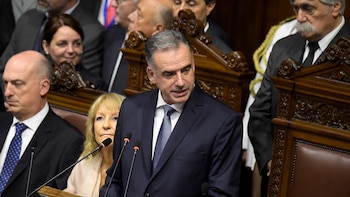
(ATR) Despite signs of progress in Rio de Janeiro, the IOC remains worried about the timetable to complete important projects for the 2016 Olympic Games.
Speaking at the end of her fifth visit to Rio as chair of the IOC Coordination Commission, Nawal El Moutawakel praised the progress but also pointed out that tight deadlines and delays are worrying.
"Solid progress has been made in a number of areas such as venue modeling, test event preparation, accommodation, sustainability, spectator experience, and marketing, among others," she said.
"Since we were here last February lots of work has been done, however, some timelines are very tight. Rio must therefore continue to focus on its top priorities, such as completing the matrix of responsibility and delivering the venues and associated infrastructures," she stressed.
Rio de Janeiro is in the midst of constructing new high speed bus transit lines and an extension of the metro subway.
Gilbert Felli, executive director of the Olympic Games, said "Let's take as an example the subway line: we are concerned because the deadline [to finish] is very close to the start of the Games. So, for us, that is a work that will always be in the red. The problem is that there is no contingency plan in case something goes wrong."
In addition to transportation infrastructure, Rio must build more than a dozen new Olympic venues in the western suburbs.
The Deodoro cluster is one of the problem spots, said the IOC.
Deodorowill play host to field hockey, rugby, equestrian, and mountain biking. All venues need to be built.
Felli says delays in venue construction are the result of bureaucracy and lack of transparency. Different authorities have been responsible for Deodoro, he observed.
"Now it is the municipality of Rio. We talked about that it is time to complete the matrix of responsibility," he said, referring to which arm of government is responsible for delivering the project.
Regarding theprotests that rocked Rio and other cities in June during the Confederations Cup, El Moutawakel said she is not concerned that the Olympics would become a target of public wrath.
Many ideas that emerged from the protests, such as better education, are supported by the IOC, she said.
But Felli warned Rio that it cannot ignore the protests, either.
"Rio2016 needs to engage the media and Brazilian population more," he said.
IOC panel members who spoke to Around the Rings this weekend in Rio say they have seen signs of progress. They say the presence of CEO Sidney Levy – who only began work in January – is making a positive difference.
One IOC panel member is less sanguine, calling the situation in Rio "distressing".
Since the end of the London Olympics, the IOC Coordination Commission is now on a twice a year schedule to visit Rio de Janeiro. Its last visit was in February and it will meet next in March 2014.
Written and reported by Phil DeWit and Ed Hula in Rio de Janeiro.
For general comments or questions, click here
20 Years at #1:
Últimas Noticias
Utah’s Olympic venues an integral part of the equation as Salt Lake City seeks a Winter Games encore
Utah Olympic Legacy Foundation chief of sport development Luke Bodensteiner says there is a “real urgency to make this happen in 2030”. He discusses the mission of the non-profit organization, the legacy from the 2002 Winter Games and future ambitions.

IOC president tells Olympic Movement “we will again have safe and secure Olympic Games” in Beijing
Thomas Bach, in an open letter on Friday, also thanked stakeholders for their “unprecedented” efforts to make Tokyo 2020 a success despite the pandemic.

Boxing’s place in the Olympics remains in peril as IOC still unhappy with the state of AIBA’s reform efforts
The IOC says issues concerning governance, finance, and refereeing and judging must be sorted out to its satisfaction. AIBA says it’s confident that will happen and the federation will be reinstated.

IOC president details Olympic community efforts to get Afghans out of danger after Taliban return to power
Thomas Bach says the Afghanistan NOC remains under IOC recognition, noting that the current leadership was democratically elected in 2019. But he says the IOC will be monitoring what happens in the future. The story had been revealed on August 31 in an article by Miguel Hernandez in Around the Rings

North Korea suspended by IOC for failing to participate in Tokyo though its athletes could still take part in Beijing 2022
Playbooks for Beijing 2022 will ”most likely” be released in October, according to IOC President Thomas Bach.




